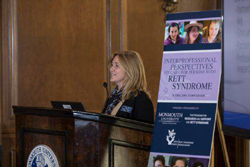The new Kognito program, provided by Counseling and Psychological Services, is designed to help students and faculty identify and approach students who may be at risk of experiencing mental issues. According to University Counseling and Psychological Service personnel, the program will provide guidelines for helping students seek treatment.
Kognito is an interactive online training program designed to help faculty and students learn how to recognize the signs of a student who may be dealing with a mental issue. It then provides the communication tools necessary to approach such a student.
The goal is to aid students and faculty in encouraging others to seek help when dealing with psychological distress, as described by the Kognito official website.
There are two separate programs offered online, according to Magda Isack, the Account Manager Representative at Kognito. There is an online training program specifically designed to guide faculty with helping students, which takes 45 minutes to complete. There is also the online program aimed to guide students with assisting other students who may be encountering mental concerns, which takes 30 minutes to complete.
According to the Kognito website, “Almost 80 percent of students that commit suicide aren’t seen by a counselor.” The University hopes to reduce this number with the Kognito program. Kognito supports early counseling and interventions in an effort to prevent such an event.
Dr. Franca Mancini, Director of Counseling and Psychological Services, expressed the need to reduce this statistic. She explained that people need to seek help when necessary. “If we can get people in, we can help them,” she said. Mancini added that it is vital to address mental issues as early as possible.
Often times, people seek help after they have spoken with a concerned relative or friend, explained Mancini. “When you ask a question, you open a door.”
She went on to express the need for people to speak up and express themselves when they are concerned about the mental health of an individual in order to prevent any issues.
“I would rather have a friend that’s mad at me than one who isn’t around anymore,” said Mancini.
Completing this program will provide a student or faculty member with transferable life skills that can be utilized in several situations. When helping others, often times a person performs a self-reflection. He or she begins to think about their own personal mental health, and how their thinking can be changed or improved.
“We are all part of a solution,” stated Mancini in reference to the campus community. She explained that everyone has the ability to help someone who is struggling mentally.
Mancini further identified how the community needs to be informed on the topic of mental health. Knowledge of the issue will allow the community to be comfortable with speaking up, as they will know where to refer students in need.
Isack explained that the program is designed to specifically help college students. According to the Kognito website, more than 300 campuses nationwide are currently utilizing the Kognito program.
The website explains that Kognito helps students support themselves while also giving advice on how to support their peers. Isack explained that the program helps not only students with mental concerns, but also “those who are dealing with drug and alcohol addiction.”
Kognito has 24/7 accessibility, which allows people to inform themselves in the comfort and privacy of their own home whenever they are available. It is “something we are putting in to place to prevent students before they are dealing with a major mental health problem,” said Nicole McQueen, business administration major.
McQueen works in the offices of the Counseling and Psychological Services Department. She said, “The Counseling and Psychological Services Department is trying to have Monmouth University be a community that looks out for one another.”
The program also works to eliminate stigmas or stereotypes that have been linked with mental health patients. This can be done by better informing students of the issues of mental health. Eliminating the stigma will allow mental health patients to feel more comfortable about being honest with their condition and seeking help.
The program was launched this past September and will remain available until the end of May 2014. To begin the program, go to http://kognitocampus/faculty or http://kognitocampus/students. The access code for the program is Monmouth 571.
The Kognito program is mainly an online program. However, there should be classroom presentations that trained faculty will give in the future. These presentations will also cover aspects of the Kognito program such as how to identify someone who may be at risk of a mental issue.
There will be flyers sent out around campus in the future. For more information on the program or on mental health in general, visit the University’s website www.monmouth.edu/conseling or visit the Counseling and Psychological Services Department located on the third floor of the Rebecca Stafford Student Center.
For more information on suicide prevention, visitwww.jedfoundation.org.


